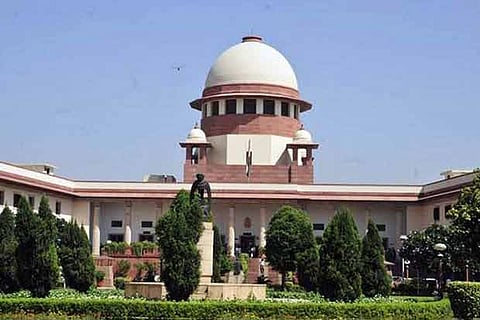

New Delhi
The collection of biometric details of citizens by UIDAI from 2010 onwards till 2016, when the enabling Aadhaar law came into force, was "illegal" and "invalid" and the collected data deserved to be destroyed, the Supreme Court was today told.
The arguments alleging invalidity of data, collected during 2009-2016 due to the lack of a statute, were advanced before a five-judge constitution bench headed by Chief Justice Dipak Misra which is hearing a clutch of pleas including one filed by former high court judge K S Puttaswamy challenging the constitutional validity of the Centre's flagship Aadhaar scheme and its enabling 2016 Act.
"The State's failure to enact the Aadhaar Act for six years meant that all enrolments done between 2010-2016 were without any informed consent," senior lawyer K V Vishwanathan, appearing for activist Aruna Roy, told the bench which also comprised justices A K Sikri, A M Khanwilkar, D Y Chandrachud and Ashok Bhushan.
Then bench then asked the lawyer as to what will happen to the data collected prior to the enactment of the law. Vishwanathan replied saying that the data needed to be destroyed.
The top court had yesterday extended the March 31 deadline for mandatory linking of Aadhaar to avail various services and welfare schemes run by the government till it delivered its verdict on the validity of the 12-digit biometric number and its enabling law.
During the hearing, the senior lawyer said, "During this period (2010-2016), there were no statutory procedure that regulated the enrolment, storage, and further use of identity information.
"Consequently, the fundamental rights of citizens were being violated through the collection, storage, and use of their personal data by the State and private entities in a legislative vacuum."
It is well-settled that a validating law must remove the cause of invalidity of previous acts, he said.
"There was no informed consent or such other procedural guarantees and safeguards as are essential if the State
seeks to infringe the right to privacy by taking biometric details of the citizens," the lawyer said.
"Biometric data is part of one's body and control over one's body lies at the very centre of the right to privacy," he said.
He said that privacy rights exist both against the State and non-State actors.
"However, apart from the fact that the latter are defined by consent and choice, there is a qualitative difference between the individual-State relationship, and the individualcorporation relationship, making privacy concerns vis-à-vis the former more salient," he said.
The arguments remained inconclusive and would resume tomorrow.
The court asked other counsel for petitioners, opposed to the Aadhaar scheme, to conclude arguments by tomorrow and asked Attorney General K K Venugopal to commence his arguments on March 20, on behalf of the Centre.
Senior advocate Kapil Sibal, appearing for the West Bengal government, had said the proof of identity has to be linked with the status of the person which entitles him or her for the benefit and moreover, the citizens must have the choice to prove their identity.
Visit news.dtnext.in to explore our interactive epaper!
Download the DT Next app for more exciting features!
Click here for iOS
Click here for Android